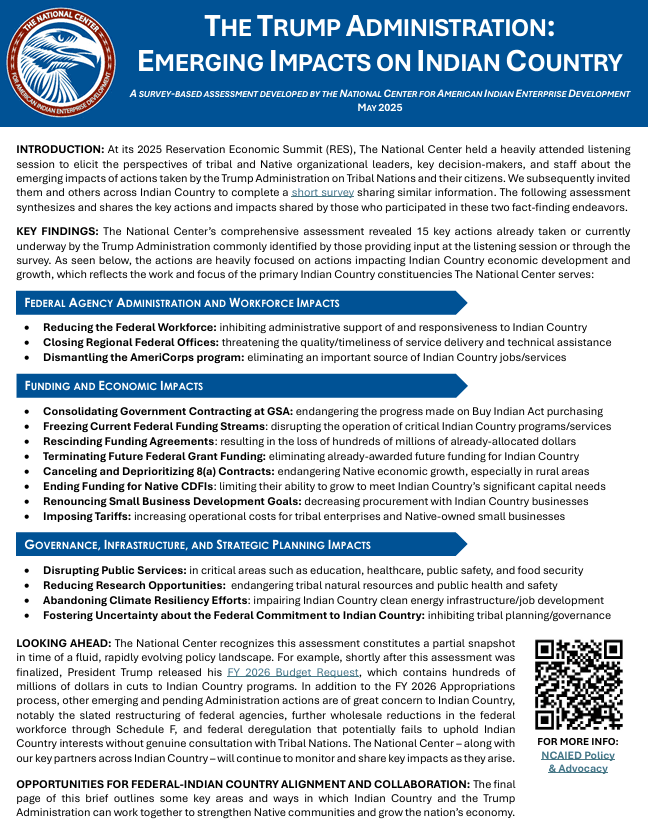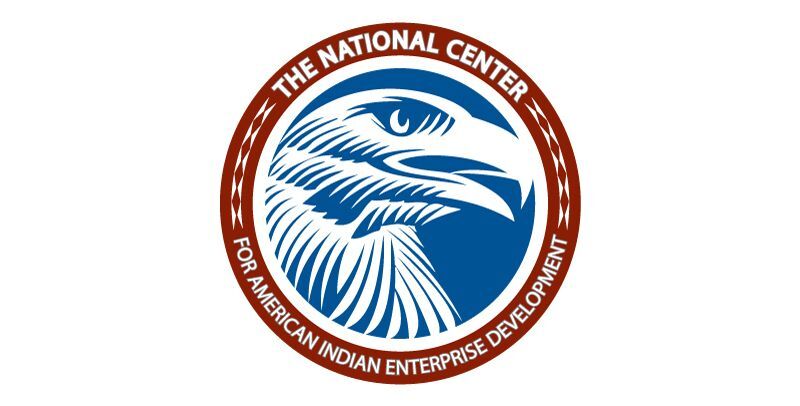
Document is based on more than 100 survey responses and testimonials from a wide array of tribal and Native organizational leaders and key decisionmakers
May 13, 2025
MESA, AZ – Enacted and proposed Trump Administration policies are already having widespread and often deep impacts on Indian Country. That’s the key takeaway from a survey-based assessment conducted by the National Center for American Indian Enterprise Development (The National Center) over the last two months. The analysis is based on testimony provided at a listening session at the March 2025 Reservation Economic Summit (RES), and submitted via an online survey conducted by the National Center in the weeks following RES. The perspectives of more than 100 respondents – primarily tribal and Native organizational leaders, key decisionmakers, and staff - are reflected in the final document.
The full analysis, which showcases those policies/actions most commonly cited as having the most significant impacts, is available on the Policy and Advocacy page on The National Center’s website.
The impacts are grouped in three categories: Federal Agency Administration and Workforce; Funding and Economic; and Governance, Infrastructure, and Strategic Planning. There are 15 specific areas of concern, with quotes from survey respondents explaining the current or potential impacts, as well as background and analysis of each cited concern. The survey also includes several areas in which respondents expressed optimism about the potential positive effects of Trump Administration policies.
While funding and staff cuts at primarily Native-serving federal agencies and offices have been well documented, survey results indicated staffing reductions in and eliminations of programs with a broad, national mandate also have a disproportionate impact on Indian Country. For instance, one respondent, who is director of economic development for a federally recognized tribe, indicated that the elimination of the AmeriCorps program could lead to the “loss of 10 support members in our Culture & Language, Nation Building, Entrepreneurship, VITA and Financial Literacy programs.”
“Indian Country could feel a disproportionate impact from many of the Administration’s broad proposed or enacted policies, funding reductions, and staff elimination,” said Chris James, President and CEO of The National Center. “Our goal is to better understand the real-world effects of these actions, and give leaders worried about the future of their communities a way to express their views.”
The survey is not a quantitative analysis of Administration actions, nor is it intended to be comprehensive. Rather it is a qualitative snapshot of the real-world impacts that will better inform policymakers and advocates working on these issues. As the survey notes, the rapidly evolving nature of the policy landscape makes comprehensive analysis difficult. For example, the survey concluded prior to the Administration’s FY 2026 Discretionary Budget Request and subsequent Congressional appropriations process. In addition, several actions have since been rescinded or modified, though general uncertainty from the federal government was itself a frequently cited concern.
The responses are anonymized so participants would feel comfortable speaking freely. Other surveys, such as one conducted by Rep. Sharice Davids (D-KS) and another by the bipartisan leadership of the Senate Committee on Indian Affairs, are also valuable resources for those seeking to understand how tribal communities are and will be affected by Administration policies.
Several respondents also expressed optimism about the potential benefits of Trump Administration policies. Areas cited include removing harmful additives from food; the potential for expanded business opportunities resulting from “America First” policies; increased, tribal self-determined energy development on tribal lands; the reduction of regulatory red tape; and more efficient allocation and use of federal tax dollars. After President Trump’s election, The National Center led a multi-partner effort to draft and submit to the transition team a list of Indian Country policy priorities for the Administration; many of these suggestions built on policies and actions from the first Trump Administration.
“We hope the survey serves as a conversation starter between the Administration, policymakers, and Indian Country as we seek a more collaborative path forward,” James continued. “Indeed, there are many areas in which the Administration and Indian Country can work together to achieve mutual goals. However, these goals are much harder to achieve if the programs that serve Indian Country – and the staff who support these programs – are gutted.”


